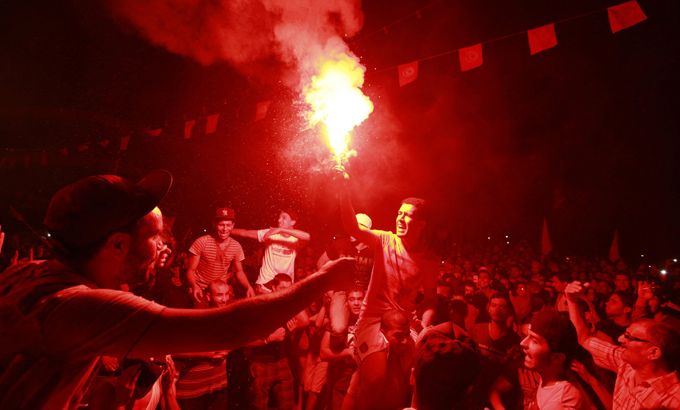Tunisia anti-government protests rage on
Police fire tear gas at protesters gathered outside the country’s parliament, as government stresses its legitimacy.

Police have fired tear gas as pro- and anti-government protesters have clashed outside the Tunisian parliament building after the burial of a prominent opposition figure.
Sunday’s demonstrations took place in the capital Tunis, with supporters of Mohamed Brahmi, the slain opposition leader, and those who support the ruling Islamist Ennahda party being separated by security barricades and riot police.
“Enough with Ghannouchi,” the opposition crowd chanted, referring to Ennahda chief Rached Ghannouchi. “The people want the fall of the assassins.”
Ennahda supporters retorted that the parliament was a “legitimate” body and that the demonstrators should not invite any non-democratic action.
Protests began on Saturday, after Brahmi’s burial, with demonstrators calling for the fall of the government marching to the constituent assembly and clashing with riot police, who fired tear gas to disperse them.
The demonstrations later tapered off but erupted again overnight when thousands of supporters and opponents of the government led by the Ennahda party squared off outside.
After the clash on Sunday morning, they continued until late into the night, with the police separating both groups.
“The groups are peaceful so far, and the police is holding them apart,” reported Al Jazeera’s Youssef Gaigi from Tunis.
Earlier on Sunday, Interior Minister Lotfi Ben Jeddou pledged to guarantee the safety of anti-government demonstrators, leftist MP Samir Taieb said.
“The minister told us that he has clearly given orders for [security] agents not to use force against demonstrators and those who take part in the sit-in before the National Constituent Assembly,” he said after a meeting with Ben Jeddou.
Tensions high
Brahmi’s murder outside his home on Thursday has stoked tensions in the North African nation where the Arab Spring began.
Many Tunisians blame the government for not reining in armed groups accused of a wave of attacks since former president Zine El Abedine Ben Ali was toppled in a popular uprising in 2011.
Opposition figures are calling for the government to resign and the powerful General Union of Tunisian Labour (UGTT) was due to convene on Monday “to decide the fate” of the country, its secretary general Sami Tahri said.
Salafists close to the Al-Qaeda-linked group Ansar al-Sharia, blamed by the authorities for Brahmi’s murder, denied any involvement in an online statement released on Sunday.
Brahmi was gunned down in the Ariana suburb of Tunis, his body riddled with 14 bullets, almost six months after the murder of opposition politician Shokri Belaid.
Authorities say the same gun was used in both killings, and blamed fighters close to Ansar al-Sharia.
In a Facebook statement, however, the group denied responsibility for what it called “a political assassination, part of attempts to push the country toward chaos”.
Brahmi’s murder “only profits remnants of the former regime and lackeys of the Zionists and Crusaders”, it said.
Hundreds of thousands of mourners thronged the streets of Tunis on Saturday in an emotionally charged funeral to El-Jellaz cemetery where Brahmi was buried next to Belaid.
Slogans vowing to “avenge” Brahmi and Belaid rose from the sea of mourners.
Al Jazeera’s Gaigi reported that the political crisis in the country was worsening, with 70 members of the constituent assembly having suspended their membership.
The 217-member body needs a two-thirds majority to approve any draft constitution, and if more than 73 members pull out, that number will be unachievable.
The secular opposition on Sunday announced that it was examining the possibility of establishing an alternative “salvation government” to challenge Ennahda’s rule.
“Ennahdha and its coalition will not give up the constituent assembly and its legitimacy,” reported Gaigi.
“They are also unlikely to dissolve the government. One scenario is that both groups agree on an election date and a more inclusive constitution. If the two groups are stubborn in their demands, there could be violence.”